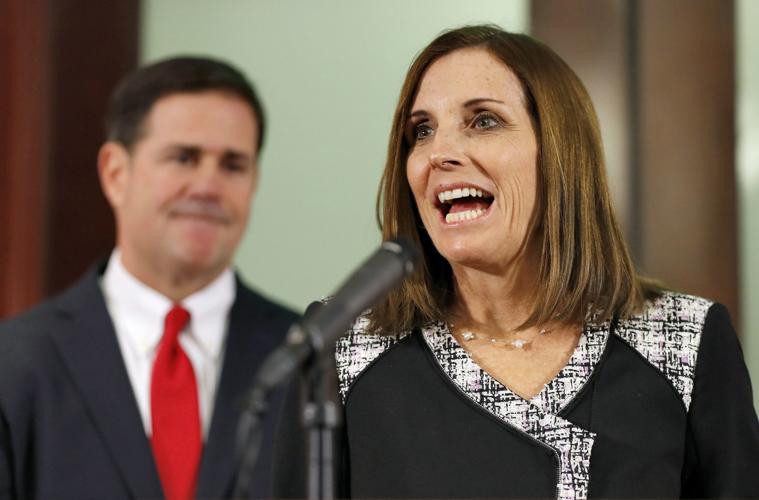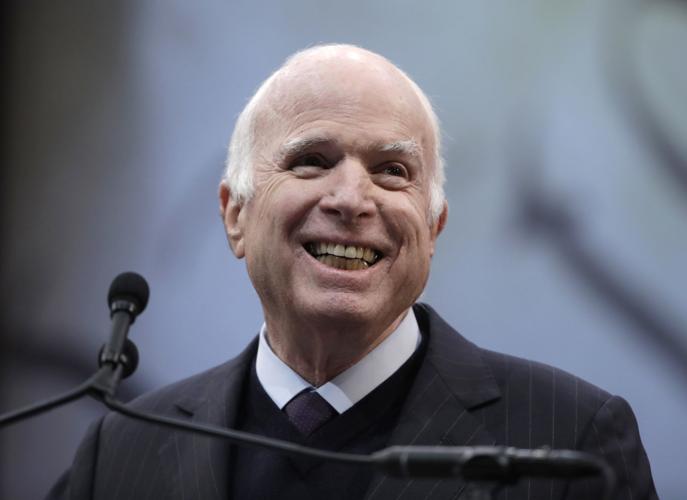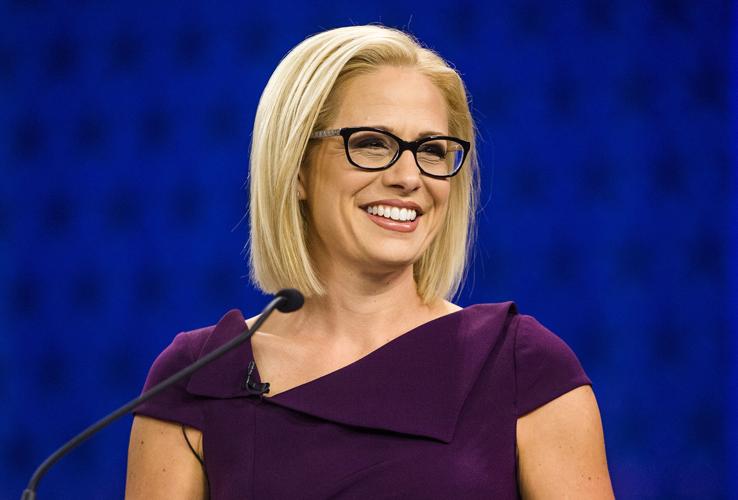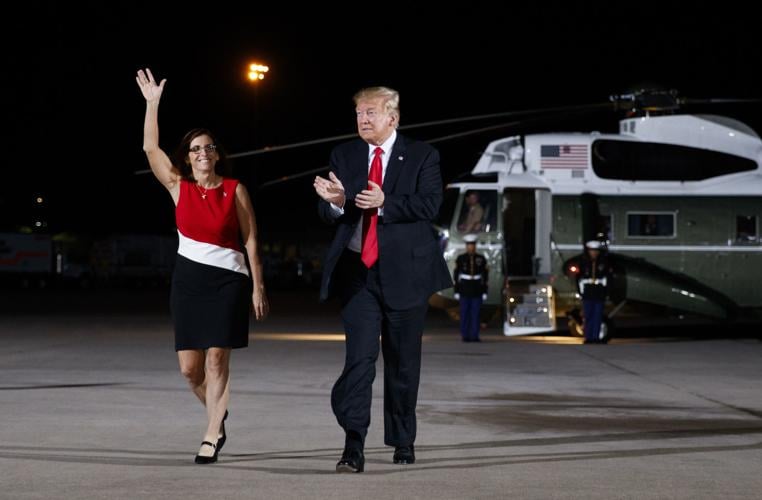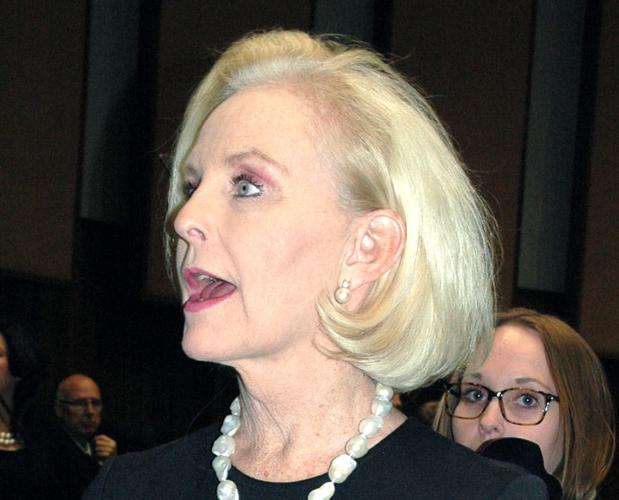PHOENIX — A month after Congresswoman Martha McSally lost her bid for the U.S. Senate, Gov. Doug Ducey appointed her to the seat that had been held by John McCain.
At a news conference Tuesday, the governor acknowledged that McSally was defeated by Democrat Kyrsten Sinema in the November election for Arizona’s other U.S. Senate seat, which was open due to Jeff Flake’s retirement.
But Ducey said that did not disqualify McSally, a Tucson Republican who has served two terms in the House of Representatives, from moving to the upper chamber.
“Arizona needs someone who understands the critical issues, who can get to work on Day One, and who embodies a spirit of service, putting the people we represent above all else,” the governor said. By law, Ducey was required to name a Republican like McCain.
The move comes after the long-anticipated decision by Jon Kyl, whom Ducey appointed as at least an interim replacement for McCain after his death in August, to return to the private sector. Kyl made it clear from the beginning he likely would not want to keep the seat until the 2020 election.
It also comes after the Republican governor was openly lobbied by Senate Majority Leader Mitch McConnell to name McSally to the seat.
But Ducey insisted the choice was his, and his alone: “I think the fact that I’m standing here and now with Martha McSally at my side, making the appointment to the United States Senate, says everything that needs to be said.”
Both Ducey and McSally were careful to give credit to Sinema, who defeated McSally last month by more than 55,000 votes out of almost 2.4 million votes cast.
Ducey said Sinema will be sworn in first on Jan. 3, giving her not just the title of being the state’s senior senator but also the bragging rights of being Arizona’s first female senator.
That decision was arranged at Ducey’s direction, his office said. McSally will be sworn in later on Jan. 3.
She promised to work closely with Sinema, saying they were able to do that when they were both members of the House.
“We had a very spirited campaign, but it’s over,” McSally said.
“Spirited” may be understating it.
During their sole televised debate, McSally chided Sinema for making comments in a radio broadcast in 2003, during her anti-war days.
Asked if it was OK to fight for the Taliban, Sinema said, “Fine, I don’t care if you want to do that.” McSally said that amounted to Sinema saying “it’s OK to commit treason.”
On Tuesday, McSally brushed aside her comments.
“The election’s over and the people have spoken and I’m honored to have this appointment,” she said. “Now, for all of us, it’s about moving forward.”
McSally did herself no favors earlier this year when taking credit for a new defense spending bill and standing with President Trump when he signed it without either mentioning McCain — no small snub as the legislation was named the John S. McCain National Defense Authorization Act of 2019.
She sought to make amends by meeting this past week with Cindy McCain. That apparently paid off, with the senator’s widow on Tuesday providing what at best could be described as a lukewarm endorsement of the appointment.
“I respect Doug Ducey’s decision to appoint Rep. McSally to fill the remainder of his term,” she wrote in her twitter feed. “Arizonans will be pulling for her, hoping that she will follow his example of selfless leadership.”
Others in the McCain clan were not as generous.
In a tweet several days ago as Ducey was weighing his options, Ben Domenech, husband of the late senator’s daughter Meghan McCain, said McSally would be an “unwise choice.”
“She’s like an NFL team that plays down to its opponents’ level,” he wrote. “And she’ll be tasked with running for re-election immediately.”
Meghan McCain retweeted her husband’s comments, but has made no statement of her own.
Domenech took another swat at McSally after the announcement Tuesday, questioning in The Federalist — a conservative online magazine that he publishes — whether the newly minted senator can hold on to the seat she was handed.
“The demands of running non-stop are hard enough when you’re talking about a House seat,” he wrote.
“In this case, McSally will have to do something she hasn’t done before — win statewide — in back-to-back election cycles,” Domenech said.
“Whether she holds the seat in 2020 comes down to whether McSally has the capacity and the humility to learn from her mistakes as a campaigner, and chooses a new political team with a proven record of winning in purple states.”
Ducey sidestepped a question about the family opposition.
“I think you all know the regard that I hold Senator John McCain in and his legacy as an Arizona treasure, an American icon and a hero to our country,” the governor said. “I have the same feelings about Cindy and the entire McCain family for that matter.”
Ducey said last week’s meeting between McSally and Cindy McCain enabled them to “clear the air.”
“And now it’s time to get to work,” he said.
One factor that may have affected Ducey’s decision is the fact cited by Domenech: McSally will have to run again in 2020 for the remaining two years on McCain’s original six-year term. And whoever wins that race then has to turn around to campaign for a full six-year term in 2022.
That will require someone with not just campaign experience but the ability to raise money, both of which McSally has proven.
Republican-turned- Democrat Grant Woods, a former state attorney general, has already said he might run in 2020. And U.S. Rep. Ruben Gallego, a Phoenix-area Democrat, also has expressed some interest in the seat.
The governor acknowledged he was giving McSally a Senate seat she could not win on her own in 2018.
But he said McSally still tallied more than a million votes and that the vacancy provides her the opportunity to serve alongside Sinema.
Ducey, in announcing the appointment, made no mention of the 2020 race.
Instead, he cited McSally’s 26 years in the military, her six deployments to the Middle East and Afghanistan and that she was the first woman to fly in combat and to command a fighter squadron in combat.
The governor thanked Kyl, who retired from the Senate at the beginning of 2013 but agreed to serve again last year at least on an interim basis.
Kyl’s appointment was crucial as the Senate was preparing to vote on the Supreme Court nomination of Brett Kavanaugh. And Kyl, a Washington, D.C. political consultant and lobbyist, was a clear Kavanaugh supporter, having already taken on the role of being the nominee’s “sherpa” during the confirmation process.
Kyl was not at Tuesday’s event — Ducey said he was in Washington to vote on an issue — but did provide a statement of support for McSally.


